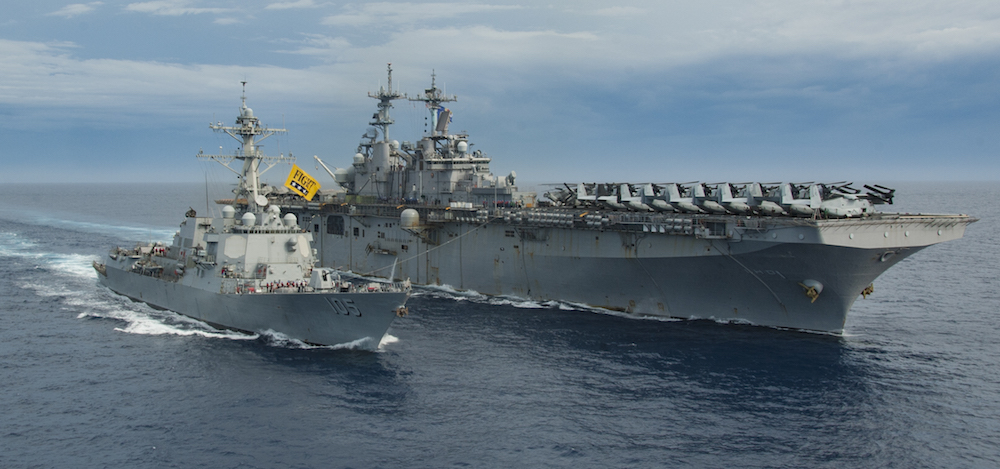
Unveiling the Secrets to New Manager Success
… [Read more](https://www.managersclub.com/unveiling-the-secrets-to-new-manager-success/ "Unveiling the Secrets to New Manager Success")


PHILIPPINE SEA (April 12, 2018) The guided-missile destroyer USS Dewey (DDG 105) receives fuel from the amphibious assault ship USS Wasp (LHD 1) during a fueling-at-sea (FAS). (U.S. Navy photo by Mass Communication Specialist 3rd Class Taylor King/Released)
I am interested in military leadership and the stories of military leaders. I served in the US Navy for several years and met some amazing leaders there.
Is being a military leader the same as a civilian engineering leader? The short answer is no. But there are many transferable lessons. The military invests a lot in teaching and developing leaders and military leaders have the opportunity to try and apply different leadership techniques.
Here are four interesting books (recommended by leaders interviewed on this site) all written by former U.S. Navy leaders where they extract what can be applied to civilian leadership.

This is a story about leadership and empowerment told by Captain David Marquet based on his experience in the U.S. Navy submarine force. Capt Marquet took over as commanding officer for the USS Santa Fe and transformed it from the lowest-performing to top-performing nuclear submarines.
Each chapter ends with several “Questions to Consider,” e.g. “What must leaders overcome mentally and emotionally to give up control yet retain full responsibility?”
Key items from this book include:
This book was recommended by Mike Hansen, Head of Product Development and Engineering for Sonatype who was also in the U.S. Navy.

This book discusses leadership lessons learned by Navy SEAL officers Jocko Willink and Leif Babin while deployed in the Iraqi city of Ramadi in 2006.
The book is divided into 3 chapters: Winning the War Within, The Laws of Combat and Sustaining Victory and how each can be applied to a business or social context. The book includes really gripping stories of the battles they fought in.
Some takeaways from this book include:
There is also an awesome podcast Jocko Podcast where Jocko Willink discusses many of the same topics from Extreme Ownership and also the lessons from many other military leadership books. He goes into great depth there and some episodes are over 3 hours long!

The book covers lessons learned from fighting against Al Qaeda and ISIS. It deals with the principles of adaptability, information-sharing and decentralized command in a complex changing world and how these can be applied to business.
I have not read this one yet, but I saw one of the co-authors David Silverman speak and the book is highly recommended by my friend Jerry Li who was also interviewed on this site. It’s a great interview.

This book was recommended to me by an upcoming guest whose interview has not yet been published.
In this book, Captain Abrashoff goes over the ideas and techniques that he used during his 20-month tenure aboard the guided-missile destroyer USS Benfold to transform the ship the from an under-performing ship into the best performing ship in the U.S. Navy’s Pacific Fleet.
If you have any other suggestions, please share in the comments. Enjoy!

… [Read more](https://www.managersclub.com/unveiling-the-secrets-to-new-manager-success/ "Unveiling the Secrets to New Manager Success")

… [Read more](https://www.managersclub.com/accelerating-ai-in-your-team-strategies-for-success/ "Accelerating AI in Your Team: Strategies for Success")

In this video, Rajesh Janakiraman, an engineering manager at Google, shares his insights and experiences on leading business critical projects while ensuring his team remains motivated and doesn’t burn out. Business critical projects can be intense, high visibility deadlines that often shift roadmaps and include executive-level oversight. Building the right team, maintaining communication, and managing expectations around these challenging projects are crucial to preventing burnout and driving results.

Are you on the lookout for a collaborative, engaging community tailored specifically for your role? Look no further! Introducing the Managers Club Discord server dedicated to leadership in engineering. We’re a community of engineering managers, team leads, and CTOs who come together to share experiences, best practices, and insights.

Are you an Engineering Manager curious about gauging your effectiveness and success in your role? In this insightful episode, we dive deep into metrics and stakeholder management with Ivan Bilan, an experienced engineering manager. Discover the core metrics for measuring engineering manager performance in people leadership, product quality, delivery, and self-promotion, and learn the importance of stakeholder management in driving team success. In this video, we will be looking at how to measure success and performance for managers. We’ll be exploring different methods and tools that managers can use to measure their own success, as well as the success of their team. Don’t miss out on these valuable insights and strategies!

In this engaging conversation, experienced technical recruiter Kate Parton shares vital advice and insider tips for candidates seeking job opportunities in the tech industry. She discusses red flags to watch for, navigating compensation discussions, common misconceptions about the recruiting process, and how to make the most of your partnership with a recruiter. Discover the role of social media and the rise of AI in the hiring process. Kate shares valuable tips and advice on making your job search and interview process smoother and more successful. Tune in for an insider’s perspective on the world of recruitment and how to avoid common pitfalls!